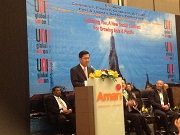Thailand backs UNI Global Framework Agreements

Thailand’s Deputy Prime Minister has endorsed UNI Global Framework Agreements as a way of keeping labour standards high in multinational companies worldwide.
UNI has secured 50 global agreements with multinationals. The agreements aim to deliver respect for core labour standards and socially responsible business practices.
Speaking at the UNI APRO Sector Conference in Bangkok, His Excellency Mr Phongthep Thepkanjana said companies that commit to global agreements should ensure labour standards apply to workers at their subsidiaries too.
The move comes at a time when economic unrest is impacting Thailand’s workforce. The country fell into recession after GDP shrank unexpectedly by 0.3 per cent between April and June. The contraction followed a 1.7 per cent loss in the previous quarter. The results are particularly shocking considering the Thai economy surpassed 6 per cent economic growth last year.
The government has expressed concern over the growing use of precarious work contracts in Thailand and has vowed to “review the implications” of such contracts. Mr Thepkanjana expressed particular fears for dispatched workers and contractual workers, to whom, he said, banks refuse to give loans.
It was a speech that lamented the decline of lifetime employment, but Mr Thepkanjana also recognised that businesses require flexibility just as workers need security, and he said that the government had doubled the minimum wage to help Thai workers “live a life.”
UNI General Secretary Philip Jennings called on financial markets and global leaders to protect Thailand during its period of economic turbulence. Jennings said Thailand is well prepared to fight the crisis.
“The Thailand of today is not the economic Thailand of 1997 and 1998. It is not clear that financial markets have understood the new Thai reality.
“An economy restructured, building domestic demand, commitments to infrastructure, stronger reserves, new financial regulations, a current account in better shape. This will help weather the storm.”
Jennings talked of an economic power shift towards Asia and the Pacific. Asia, he said, had become a continent where people have stood up for change, for democracy, and for a better quality of life. But the UNI General Secretary also warned of the spread of inequality throughout the continent.
“Asia is growing. Wealth is growing. Poverty reduction is a reality. In Thailand, in just over a generation, there is progress from when half the population lived in poverty to where today it’s 1 in 12. But there is a shadow whose cast cannot be ignored - the shadow of inequality.”
“It is time to reverse this trend. We can help - strong unions, comprehensive collective bargaining and a social safety net. Unions are the path to decent work and sustainable development.”
Jennings appealed to governments and business leaders to understand that precarious, insecure and poorly rewarded work is bad for the economy, bad for consumption, and would not deliver sustainable development. “Work should lift you out of poverty, not keep you in it,” he said.

